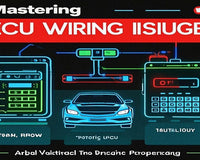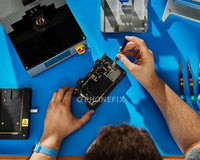
In the context of ECU IC soldering, the quality of solder paste directly impacts the longevity and performance of the newly installed ECU IC chip. The right solder paste ensures robust connections, minimizes the risk of short circuits, and enhances the durability of the solder joints.
Types of Solder Paste for ECU IC Soldering
1. Lead-Based Solder Paste
Traditionally, lead-based solder paste has been the go-to choice for many electronics applications, including ECU IC soldering. It typically consists of a tin-lead alloy (commonly 63/37 tin-to-lead ratio) and offers excellent wettability and a lower melting point, making it easier to work with. However, due to environmental and health concerns, the use of lead-based solder paste is increasingly restricted.
2. Lead-Free Solder Paste
These pastes are composed of alternative alloys such as tin-silver-copper (SAC) and offer comparable performance to their lead-based counterparts. UV559 solder paste is weakly acidic, which is very suitable for modern ECU IC soldering.

3. No-Clean Solder Paste
No-clean solder paste is formulated with flux residues that do not require post-soldering cleaning. Such as RL-403 solder paste, this type of paste is particularly advantageous for ECU IC soldering, as it simplifies the process and reduces the risk of damaging delicate components during cleaning. However, it is crucial to ensure that the flux residues are non-corrosive and stable over time.

4. Water-Soluble Solder Paste
Water-soluble solder pastes contain flux that can be easily cleaned with water after soldering. This type of paste offers excellent flux activity, ensuring strong solder joints. While it requires an additional cleaning step, the water-soluble nature of the flux ensures thorough removal, leaving no harmful residues behind.

When we perform ECU IC soldering, we should also consider that The melting point of the solder paste should be compatible with the temperature tolerance of the IC chips and the ECU board. Using a paste with an appropriate melting point ensures efficient soldering without damaging sensitive components. In addition, the flux type within the solder paste plays a pivotal role in the soldering process. Choose a flux type that matches your cleaning capabilities and the specific requirements of the ECU IC.
Choosing the right solder paste is a critical step in the successful soldering of ECU IC chips. By understanding the types of solder pastes available and evaluating key factors such as melting point, flux type, alloy composition, viscosity, and storage, you can Choose the Right Solder Paste that enhance the longevity and functionality of your ECU.









